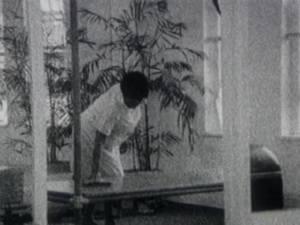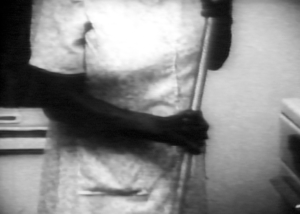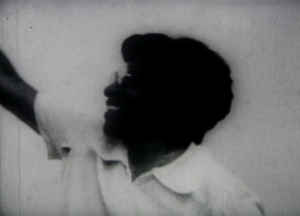



From 28 October – 3 November we’ll be presenting two essential short films from pioneering black filmmaker Fronza Woods, plus a brand new filmed interview with Woods by director Nadia Latif, on our Cinema of Ideas virtual platform.
To accompany this event, we asked Nadia to write a piece which reflected on her conversation with Woods and the experience of watching her films for the first time.
It’s very tempting to impose our own narratives when trying to summarise someone else’s life. About who is allowed to fail and succeed, about which achievements and missteps should bring us peace and which bring us pain. But first, you’ve got to get to know them. I had never heard of Fronza Woods or her films until the ICO asked if I would be interested in driving halfway across France to interview her in person.
On paper, why wouldn’t I go? A chance to talk to another director, hopefully learn something. At worst, there’d be food and wine. Then I watched her work, and my first feeling was shame. Shame that I’d never heard of Fronza, shame that I hadn’t been shouting her name from the rooftops for decades. Here was a woman trying to do exactly the same thing I was decades later – making work about blackness and black womanhood in a way that is insightful, irreverent, creative and unpretentious.
Before you meet Fronza Woods, she’s already done the work of inoculating you against simple formulations, by way of her two short films. Both produced in the 1970s, her entire oeuvre runs to ‘just’ twenty five minutes, but her achievement also pushes back against the notion that leaving a lengthy legacy is equivalent to greatness. These are two stories about black women that stop us in our worn mental tracks. In Killing Time (1979), ‘Sage Brush’ – a young African American woman played by the director herself – contemplates suicide, yet hesitates over the right outfit for her corpse-to-be. Why she wants to end it all is not so much as hinted at, replacing the answers of a suicide note with some obsidian black humour. In Fannie’s Film (1982), we meet Fannie, an African American cleaning woman who attends to the white clientele of a pilates studio. Watching lithe bodies privileged with the time to hone the body beautiful contrasted against Fannie, working for decades wiping down mirrors and exercise equipment, it’s easy to arrive at certain conclusions. Fronza confesses that she herself was keen to impose how she felt about working in the studio on Fannie. ‘A lot of it had to do with working off my own anger. I was trying to push her… I just wanted her to say, “Enough with these white people and their dirty towels!”’ But ultimately, her subject won out. ‘I really wanted to respect her and for the world to see what I saw.’
If Fronza – the woman and her work – herself didn’t push me to think more specifically, it’d be easy to say she has gone through a process of ‘rediscovery’ over the last few years. The standard ‘rediscovery’ narrative would run: black woman makes work, work is incredible but suppressed and ignored by everyone, before being brought to a wider audience of well-meaning (white) folks. Spending time in Fronza’s company urges us to consider a reinvention of this narrative, adding a constellation of asterisks to that sentence, each pointing to a footnote that complicates and interrupts.

One of those footnotes would expand on the importance of community. As I prepare to shoot my debut feature film (in fact, standing at the equivalent ‘body of work’ that the industry would recognise, with two shorts to my own name), I think a lot about what the value of community is, and what happens when you don’t have people to turn to or a way to reach the people who will connect with your work. Fronza is very clear that what we might dream of, the Harlem Renaissance of other New York black directors in the ’70s and ’80s – even people who her work shares a sensibility with like Camille Billops or Kathleen Collins – wasn’t there for her. ‘Maybe it’s because of the age I went into film, maybe it’s because of all of the things I’d done before film. It could be my fault, it could be I was too selfish, it could be I didn’t know who to go to…’ She and I look on collectives like the LA Rebellion filmmakers or the Black Audio Film Collective with a level of yearning.
For me, the idea of a collective is a protection against what the industry demands of you as an emerging filmmaker: a mix of total naivety – the fresh chick, newly hatched, ready to delight and surprise all, unjaded! – and a ‘know all the angles’ sophistication needed to get your individual project off the ground. Fronza takes more than her fair share of responsibility for not being able to navigate the industry. At the urging of a friend, after she had completed Killing Time and Fannie’s Film, she went to one of the top agents. ‘He was very polite, he was very nice, but he was not interested in my films… I just thought, “You do a good job, you’re recommended to someone else.” But weeks passed and nothing happened. You have to sell yourself in that business and I was incapable of selling myself.’ But why should we expect artists to sell themselves?

A collective isn’t a panacea against the small crumbs the film industry encourages black filmmakers to fight over. But it can be a safe harbour both in the face of indifference or failure, and to fill in the gaps when the business demands you are all things to all people. Working in a cohort of all black directors on my recent short They Heard Him Shout Allahu Akbar as part Film4’s Foresight anthology has helped me lift up other people’s work, have my work lifted up, find great people to work with and have ‘cards on the table’ conversations with people that are otherwise discouraged. If we want filmmakers to be more than canny operators of capitalism’s impossibilities, then collective work has to be part of that.
Again, though, Fronza’s story pushes back against a simple notion that identity is enough to bind us. When Fannie’s Film was shown at the Black Filmmakers Festival, it didn’t chime with the version of blackness elsewhere in the programme. ‘I have to say, it was among the most humiliating times in my life. Nobody understood what they were looking at. And I could hear people going, “What the hell is this?” Because they didn’t want to look at a black cleaning woman!’ Killing Time is no different: ‘Sometimes I think I should say, “It’s a comedy, you can laugh if you want to!”’
The process of ‘rediscovery’ is really more of a placement within a shared sensibility, where it can flourish rather than face these humiliations. Seeing work like this is another way of finding community, to be reminded that such things have happened before and can happen again. It’s essential to be connected with a broad range of artistic heritage, both of those who share your identities and those outside of it. The industry is always keen to anoint you as ‘the first’ in some way or the other, pristine soil to drive their flag into, but being on such an outcrop is lonely and disconnected. Having a broad range of reference points lets you escape the narrow versions both your own community and those outside it can put on you. But you have to be able to see it first to connect with it! So we should applaud those that grant us access while also demanding it should be in front of the people who need it most.

In the time we spent together, Fronza mentioned (at various times in her life) that she wanted to be a dancer, a plastic surgeon, theatremaker, pilates teacher, jewellery maker, editor and model. Meeting her now is a reminder of the fact that we are all leading multiple lives, and something that could have been a major turn is a passing moment. We can lament films not made by someone, but also have the humility to realise that is what we want from them, not necessarily what mattered most in their life. Just as with Fannie’s Film, we owe people the chance to be as complex as they are.
– Spotlight on Fronza Woods – Invisible Women
– 40 Years and 19,979,520 feet from stardom or, The Perils of Being (Re)Discovered – By Fronza Woods (Milestone Films)
– One Way or Another: Black Women’s Cinema, 1970-1991 (BAMcinématek 2017, programmed by Nellie Killian and Michelle Materre)
Nadia’s filmed interview with Fronza Woods, plus Woods’ two shorts Killing Time and Fannie’s Film, will be available to watch on The Cinema of Ideas from 28 October – 3 November. Book tickets here.
Nadia Latif is a theatre maker, screenwriter and director. In 2019, she directed Jackie Sibblies Drury’s Pulitzer prize-winning play Fairview and her first short White Girl.
Film Stills courtesy of Women Make Movies.